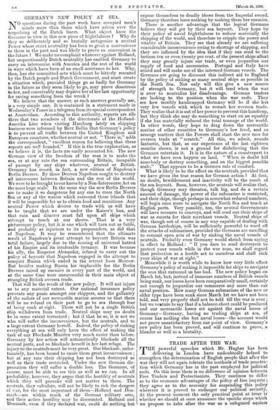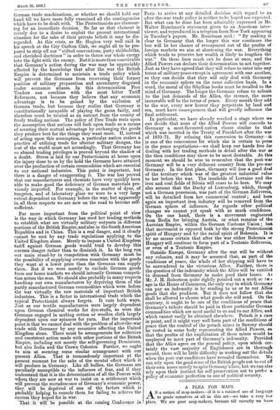TRADE AFTER THE WAR.
THE _powerful speeches which Mr. Hughes has been delivering in London have undoubtedly helped to strengthen the determination of English people that after the war they will not again tolerate the methods of trade penetra: tion which Germany has in the past employed for political ends. On this issue there is no difference of opinion betwese Free Traders and Protectionists. They continue to differ as to the economic advantages of the policy of free imports ; they agree as to the necessity for suspending this policy wherever it is proved to endanger •our political security. At the present moment the only practical point at issue is whether we should at once announce the specific steps which we -propose to like after the war as a safeguard against German trade machinations, or whether we should hold our hand till we have more fully examined all the contingencies which have to be dealt with. The Protectionists are clamour- ing for an immediate decision. So far as that clamour is merely due to a desire to exploit the present international situation for the sake of their private beliefs it may be dis- regarded. At this crisis, as Mr. Hughes very well said in his speech at the City Carlton Club, we ought all to be pre- pared to strip off our stilted conventions, party shibboleths, and cherished doctrines " in order to throw our whole energy into the fight with the enemy. But it is more than conceivable that Germany's action during the war may be appreciably affected by the knowledge that after the war the British Empire is determined, to maintain a trade policy which will prevent the Germans from recovering their former position of military preparation and ascendancy disguised under economic aliases. In this. determination Free Traders can combine with the most bitter Tariff Reformers, not because they believe that any economic advantage is to be gained by the exclusion of German trade, but because they realize that Germany is constitutionally incapable of playing the game fairly, and therefore must be treated as an outcast from the comity of freely trading nations. The policy of- Free Trade rests upon the assumption that nations will look upon trade as a means of securing their mutual advantage by exchanging the goods they produce- best for the things they want most. If, instead of acting upon this assumption, a particular nation makes a practice of utilizing trade for ulterior military designs,. the rest of the world must act accordingly. That Germany has so abused trading privileges is proved beyond the shadow of a doubt. Stress is laid by our Protectionists at- home upon the injury done to us by the hold the Germans have attained over the production of certain commodities which are essential to our national industries. This point is- important, but there is a danger of exaggerating it. The war has proved that our manufacturers and chemists have very quickly been able to make good the deficiency of German materials pre- viously imported. For example, in the matter of dyes, of tungsten, and of laboratory glass we were to a very large extent dependent on Germany before the war, but apparently in, all these respects we are- now• on the road to become self-. sufficient.
Far more important from the political point of view is the way in which Germany has used her trading methods to: establish what are virtually military outposts in different portions of the British Empire, and else in the South American Republica and in China. This' is a real danger, and it clearly cannot be met: by any trade regulations applying to the. United Kingdom. alone. Merely to impose a United Kingdom tariff against German goods would tend to develop this oNiersea danger rather than to diminish it. In the long run our main stand-by in competition with Germany must be the possibility of supplying oversee countries. with the goods they want at a lower price than- the- Germans can supply them. But if we were merely to exclude German goods from our home markets we should intensify. German. competi- tion across the seas. We should also probably in many respects handicap our own manufacturers by depriving them of the partly manufactured German commodities which were before the war virtually, the raw materials of important British. industries. This is a fa'etor in international trade which the tydpical Protectionist always forgets. It cuts both ways. Just as our textile manufacturers were largely dependent upon German chemical works for dye-stuffs, so were the Germans engaged in making cotton or woollen cloth largely dependent upon our spinners for yarn. But the important point is that we cannot deal with the problem of after-the-war tiade with Germany by any measures- affecting the United Muzak= alone. There must be arrangements for collective and consistent action made with other portions -of the British: Empire, including not merely the self-governing Dominions, but also India and: the Crown Colonies. Further, we ought taw - aim, at securing some similar • arrangement: with- our present Allies. That is tremendously important at the present, moment for the sake of the mental effect which. it- will -produce in, Germany. Like all, bullies, the -Germans are - peculiarly, susceptible to. the influence of fear, and if they understand that itis the determination. of all the Powers with wiom they. are now at war to insist on a, settleraent which will prevent the recrudescence of Germany's- economic power, they, will be deprived of one of the factors which is piobably helping to console thein for failing to achieve 'the success they hoped' for in war. That it .irar be possible at the comingConference in Paris to arrive at any detailed decision with regard to an after-the-war trade policy is neither to be hoped nor expected. But what can be done has been admirably expressed in Mr. Walter Runciman's statement given to an American inter- viewer, and reproduced in a telegram from New York appearing in Tuesday's papers. Mr. Runciman said : " By making a it clear to Germany that the longer this war continues the • less will be her chance of recoupment out of the profita of -foreign markets we aim at shortening the war. Everything which tends to preserve her wealth is likely to lengthen the war." On these lines much can be done at once, and the Allied Powers -can declare their determination to act together. Just as they: have agreed that they will refuse to enter into any terms of military peace except in agreement with one another, so they can decide that they will only deal with Germany in the economic sphere on the same collective basis. In a word, the moral of the Sibylline books must be recalled to the mind of Germany. The longer the Germans refuse to submit to the just demands of the. Allies, the sterner, the more inexorable will be the terms of peace. Every month they add to the war, every new horror they perpetrate by land and sea, must have consequences that will greatly influence the final settlement.
In particular, we have already reached a stage where we can decide that none of the Allied Powers will concede to Germany a most-favoured-nation clause similar to that which was inserted in the Treaty of Frankfort after the war of 1870-71. By refusing this concession to Germany—it is one of the concessions for which she is certain to press in the peace negotiations—we shall keep our hands free for dealing with. her trading methods in detail after the war as the then conditions may show to be most desirable. At this moment we should. be wise to remember that the, post-war Germany will be a very different country from the pre-war Germany. In the first place,, Germany will lose a good deal of the territory which was of the. greatest industrial value to her before the war. The ironfields. of. Lorraine and the iron and coal fields of Silesia will cease to bo hers. We may also assume that the Duchy of Luxemburg, whichi though not a German possession, was part of the German Zollverein, will be detached. from her commercial control and hers again an important iron, industry will be removed from the German sphere of influence. As regards other political changes we cannot yet speak with ao mach confidence. On the one hand, there is a movement engineered from Berlin for bringing Austria, or what remains of the A.ustriair Empire, within the German Customs- Union ; but that movement is opposed both by'the strong Protectionist spirit of Hungary and by the racial spirit of Bohemia. It is by no means certain that after the war either Bohemia or Hungary will continue to form part of a Teutonic Zollverein, or even 'of -a Teutonic, Empire.
Outside, Earope, .Germany after the war will be without any colonies, . and it May be assumed that, as part, of the conditions of peace, the whole of:her shipping will have to be surrendered to. the victorious- Allies. Further, there is the question of the indemnity, which the Allies will be entitled to • demand from Germany .to make- good their losses. Ai Mr. J. M. Robertson quite rightly, pointed out a week or tw, ago-in the House of Commons, the tonly way-in which Germany can pay an indemnity is by sending to us or to our Allies goods ,thst site produces. But it does not follOw that she shall be allowed to choose what goods she will send. On the contrary, it ought to be one of the conditions of peace that Germany's tribute should be paid in those particular German commodities which are most useful to us and to our Allies, and which cannot easily be obtained elsewhere. Potash is a case in point', and it might very well form part of the conditions of peace that the, control of the potash mines in Saxony should . be vested in some body representing the Allied Poweis, so that the profits of the exploitation of these mines would be employed to meet part of Germany's indemnity. Provided that the Allies agree on the general policy, upon which cer- tainly the vast majority of Englishmen are in thorough accord, there will be little difficulty in working out the details when the post-waY conditions have revealed themselves. We can rely upon the good Sense of the British people not to cut off their own noses merely to spite Germany's lace, but we can also rely upon their instinct for self-preservation not-to prefer a policy of economic perfection to one of politkal- security.



























 Previous page
Previous page